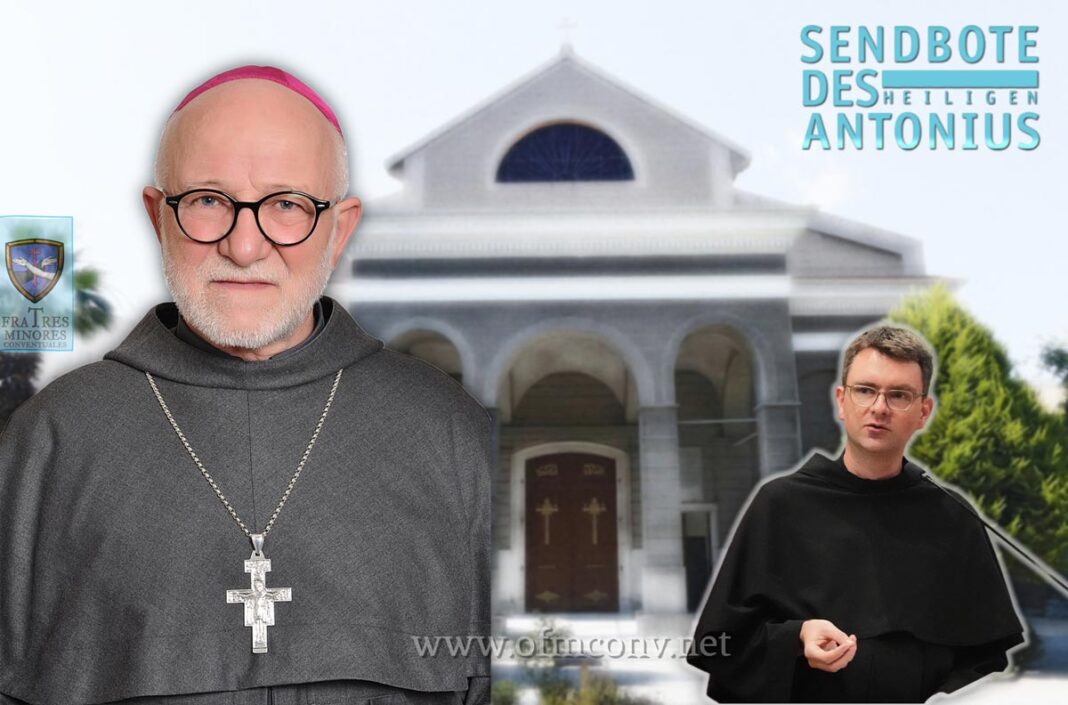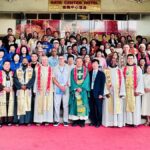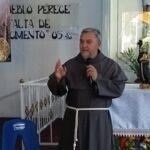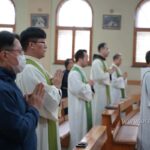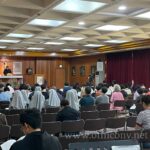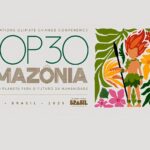There had long been speculation about the destination of the Pope’s next trip. Where would Leo XIV go? A few weeks ago, it was finally announced that the Supreme Pontiff, at the invitation of President Recep Tayyip ERDOĞAN and the local bishops, will visit Turkey on November 27-30, 2025. Afterwards, he will proceed to Lebanon. Although the Conventual Franciscan friars will not be at the center of attention in either place, two of our friars will still play a significant role. In Turkey, the Most Reverend Martin KMETEC, OFM Conv., Archbishop of Izmir, Turkey, will be the hosting bishop. In Lebanon, the Most Reverend César ESSAYAN, OFM Conv., will be serving in his capacity as Vicar Apostolic of Beirut.
Foundations of Faith
The historical reason for the trip to Turkey is the 1700th anniversary of the Council of Nicaea, considered a decisive moment in the history of the Christian faith. In announcing his visit, the pope indicated that this was an anniversary that could not be missed.
The First Council of Nicaea was convened by Emperor Constantine in 325 with the aim of preserving the unity of the early Church. It was sparked by a theological dispute over the nature of the relationship between God the Father and Jesus Christ. The Alexandrian theologian Arius argued that Christ, though unique, was created by God and therefore could not be divine in the same sense as the Father. Many other Church Fathers countered, however, that Christ is true God and consubstantial with the Father. At the end of the Council, this latter position prevailed, and Arius’s doctrine was declared heretical. In that context, the Nicene Creed was born, which proclaims that Christ is “of the same substance” as the Father. The Council of Nicaea thus set a milestone in the understanding of the Christian faith, which continues to shape the Church today.
What the Council did not manage to settle permanently was the date for Easter. Although it decreed that Easter should be celebrated on the Sunday following the first full moon after the spring equinox, since the 16th century, the Eastern and Western Churches have followed different calculations, usually celebrating Easter on separate dates. For decades, attempts have been made to arrive at a common date, but so far without success. The fact that Easter was celebrated on the same day, April 20, by the Eastern and Western Churches in 2025, was a happy but still coincidental alignment of the calendars.
Joy and Hope
The Ecumenical Patriarch of Constantinople, Bartholomew I, joyfully welcomed the announced visit of Pope Leo XIV to Turkey. In a statement, the Patriarchate expressed its “joy with at the forthcoming visit of His Holiness Pope Leo XIV of Rome to Türkiye.” On November 28, the two Primates will travel together to Iznik (ancient Nicaea) for the main celebration of the 1700th anniversary of the Council.
The Pontiff will then travel to Lebanon, a country that has been facing instability for years. Political and economic difficulties have been affecting the daily lives of the people. In an interview with Vatican News, Bishop César ESSAYAN expressed his hope that Pope Leo, following in the footsteps of his predecessors, will find the words needed to bring Lebanon back to the center of international attention and remind the world that peace is the only path that recognizes the profound dignity of every human being.
Information Box: The Archdiocese of Izmir, Turkey
Izmir has been an episcopal see since the earliest centuries. Its bishop, St. Polycarp of Smyrna (born around 69 and died in 155 or 167) has been attested to as early as the 2nd century. The Latin archdiocese was canonically erected in 1346, by Pope Clement VI. It was suppressed in 1575, but was reestablished in 1818, by Pope Pius VII. Approximately 200,000 people live within the archdiocese, but the Catholics among them are a small minority: there are only about 6,000 faithful.
* * * *
Interview with the Most Reverend Martin KMETEC, OFM Conv., Archbishop of Izmir, Turkey
Dear Archbishop KMETEC, you will soon receive an illustrious visitor to Turkey. You will be hosting Pope Leo XIV. What kind of atmosphere awaits him in the country?
I would say that we are all very optimistic. The Pope’s visit is a strong reminder that the Catholic Church is tied to the See of St. Peter and the successors of the apostles, and thus with the sacramental tradition. We feel we need to be strengthened in faith and hope.
Catholics constitute a small minority in this officially secular state, where over 90% of the population is Muslim. Could you describe some essential characteristics of the Roman Catholic Church in Turkey?
The Roman Catholic Church in Turkey is a tiny minority. We have always been considered a foreign church, but this is not really the case. Since the time of the Ottoman Empire, over the centuries, the members of our community have become a part of society, especially in the coastal cities such as Istanbul, Izmir, Mersin, Trabzon, Samsun, and Iskenderun.
Our Church’s presence has been strengthened by migrants arriving from Asia and Africa. We have churches that allow us to remain in this country, churches that witnessed the proclamation of the Gospel by the apostles, like St. John and St. Paul. We inherit the richness of the Church Fathers, such as St. Chrysostom, St. Polycarp, St. Ignatius, and St. Irenaeus, the Apostle of France.
Religious orders, such as the Vincentians, the Christian School Brothers, and others, brought education to the Ottoman Empire. It’s worth remembering that the Daughters of Charity served wounded Ottoman soldiers and, as a reward, were granted the land on which they built a hospital in Istanbul. They also had a hospital in Izmir and were involved in educating young people.
Today, all this is no longer possible. The only option left is to care for communities made up of people from different backgrounds.
Pope Francis appointed you Archbishop of Izmir on December 8, 2020. What diocese did he send you to?
Pope Francis sent me to the Diocese of Izmir-Smyrna. We are a small community and, together with the Orthodox Church, we form a small flock, the only flock descended from the Churches mentioned in the Book of Revelation. The archaeological sites of Ephesus, Laodicea, Hierapolis, Iconium, Pergamon, and others are all located within our diocese. They remind us of the importance of our roots, grounded in the preaching of the Apostles Paul and John, and later, in the Church Fathers such as St. Polycarp, St. Ignatius, and others.
You have already worked extensively in Turkey, including at the Conventual Franciscan friary in Istanbul. You probably speak fluent Turkish and are very familiar with Islam. Do you also speak Arabic?
I learned Arabic during my first mission in the Middle East. After arriving in Turkey, I learned Turkish, which was a great joy for me, despite the difficulties. All of this was training for listening to the human heart, which expresses itself through one’s own culture, so that even in these languages the word of the Gospel and of salvation may be heard.
Some time ago, in an interview, you said about your Church: “We are proud to still be here.” How do you see the future prospects for Catholics in Turkey?
I don’t think we will be a large and important reality in Turkey. For me, it’s enough if we remain faithful to Christ, to his example, and to the teachings of the Gospel. It’s enough if we remain a living Church, one that can bear witness and explain the reasons for Christian hope.
As Archbishop of Izmir, you will play an important role in the Pope’s visit. Today’s Iznik has become an important place in the history of the Church, like Nicaea. What celebrations are planned for the 1700th anniversary of the Council?
The program for the Pope’s visit has not yet been officially published. However, I can say that a commemoration is planned at the site of the Council, which will be attended by Pope Leo and His Holiness Patriarch Bartholomew. It seems there will be an academic gathering at the Church of St. Irene. The Pope is also expected to attend the festivities for the feast of St. Andrew. He will meet with men and women religious, bishops, and priests in a special meeting, then celebrate a Mass for Catholics from all over Turkey.
What message can that ancient Council offer us today, especially in societies where the question of (the Christian) God often no longer seems to play a key role?
The Council was a work of dialogue and sincere discernment, open to the guidance of the Holy Spirit. It teaches us that truth cannot belong to anyone alone; rather, we are called to glimpse it lovingly, respectfully, seeking to understand what it means to be human, created in God’s image.
The truth proclaimed by the Council is that the Son of God became flesh and became one of us in order to save us through the cross. It is very important that we humbly embrace this truth and enter into a relationship with Christ, our Savior.
Are there any historical sites in Iznik that can be visited that are connected to the ecclesiastical assembly of that time? Is there a Catholic place of worship where religious services are still held today?
In Nicaea, you can visit the church that was later converted into a mosque, where the Second Council of Nicaea (787) was held. Only the foundations of the basilica where the First Council of Nicaea (325) was held remain. They are now submerged under the waters of a lake. Currently, there is no place in Nicaea where Christian religious services can be held.
How is a papal trip of this kind planned? Who organizes what, and what are you responsible for locally? What will be on the Pope’s schedule?
A joint commission was set up with the Orthodox Church for the papal visit. The Holy See sent a delegation to jointly plan the visit and also meet with Turkish State authorities on matters of protocol and security.
The Pope’s visit will certainly be an important time. But what is normal pastoral life like? Is it comparable to church life in Slovenia, Germany, or Austria?
Pastoral life in Turkey is in some ways similar to that of European Churches. However, there is the challenge of our smallness and of hope: We hope despite the fact that we are few and without great prospects. We work according to the synodal methodology; we seek the contribution of every member of the community so that we may walk together and be strong in faith. We devote a lot of attention to the formation of the laity, who represent the future of our Church.
How are relations with the Ecumenical Patriarch and with other Christian Churches in Turkey, for example with the Protestants?
Ecumenical relations are good. We can say that the Ecumenical Patriarch Bartholomew is a friend of ours. The fact that we are all a minority together, that we are heirs of the suffering and difficulty that Christians have faced for centuries in these lands, makes us more aware of being brothers and sisters.
And finally: when the pope travels from Turkey to Lebanon, where you also lived for a few years, what would you like to say to him as a wish or request?
The Church in Lebanon needs support; at the same time, it can draw strength from a renewed witness, one free of pride, if it is ready to shed the false security that comes from the pursuit of honor and appearances. It can rediscover its true identity through faithfulness to the holiness of the saints, such as St. Charbel, St. Rafqa, and others.
Friar Andreas MURK, OFM Conv.
St. Anthony’s Messenger (Germany)


